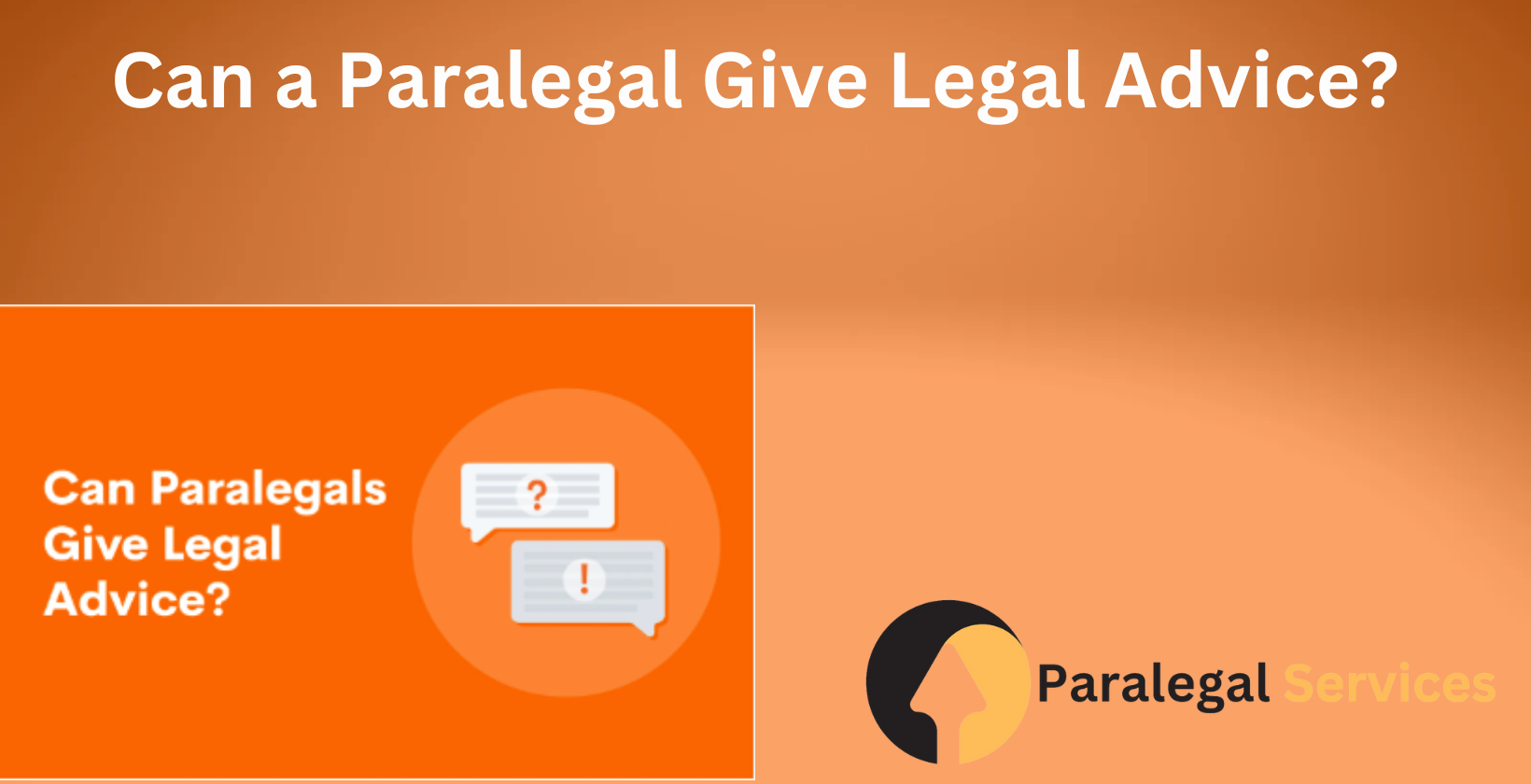No, a paralegal cannot give legal advice.
Legal advice is a professional interpretation of law that applies to an individual’s specific situation, including recommending legal actions, interpreting statutes, or drafting legal arguments. General legal information provides broad explanations of laws, legal procedures, and rights without applying them to specific circumstances.
Paralegals are often confused with attorneys because they assist with legal tasks such as drafting documents, conducting research, and preparing cases. However, paralegals do not have a law license and cannot represent clients in court, make legal determinations, or provide legal opinions.
Regulations governing paralegals restrict them from offering legal advice due to the unauthorized practice of law (UPL). In the United States, each state sets rules through its bar association, and violations can lead to penalties, including fines and criminal charges. For example, California Business and Professions Code §6450 explicitly prohibits paralegals from providing legal advice or representing clients in legal matters.
Individuals searching for clarity on a paralegal’s role should understand that while paralegals can assist attorneys, they cannot perform tasks that require legal judgment or attorney-client privilege.
What Happens If a Paralegal Gives Legal Advice?
A paralegal who gives legal advice faces penalties, including fines, disciplinary action, and criminal charges for unauthorized practice of law (UPL).
Unauthorized legal advice can result in fines ranging from hundreds to thousands of dollars, depending on jurisdiction. Legal repercussions may include civil liability, injunctions, and potential imprisonment. State bar associations and courts enforce UPL laws to protect the public from unqualified legal assistance.
Incorrect or unqualified legal advice harms clients legally and financially. A client may lose a case, face legal penalties, or make costly mistakes based on incorrect guidance. Misinterpreting a law or missing a filing deadline can lead to dismissed claims, denied benefits, or legal disputes.
Consequences vary by jurisdiction. Some states impose misdemeanor charges for UPL, while others classify severe violations as felonies. In Texas, unauthorized legal practice is a third-degree felony under Texas Penal Code §38.123, punishable by up to 10 years in prison. In Florida, violators can face up to five years in prison and fines under Florida Statutes §454.23.
Examples of penalized paralegals include:
- New Jersey (2019) – A paralegal was fined and banned from legal work for falsely representing clients in family court.
- California (2021) – A paralegal was ordered to pay restitution and cease operations after misleading immigrants with legal services.
- Texas (2020) – A paralegal faced criminal charges for drafting legal documents without attorney supervision.
Unauthorized legal advice places both the client and the paralegal at risk of serious legal consequences.
Can a Paralegal Give Legal Advice in California?
No, a paralegal cannot give legal advice in California.
California law strictly regulates paralegals under California Business and Professions Code §6450-6456, which prohibits them from providing legal advice, representing clients in court, or engaging in any activity considered the practice of law.
Paralegals in California can perform legal tasks only under the direct supervision of a licensed attorney. They may conduct legal research, draft documents, and assist with case preparation, but they cannot offer independent legal opinions or recommendations.
Under specific conditions, paralegals may provide limited assistance. They can help with document preparation in non-attorney capacities, such as legal document assistants (LDAs), if they meet state certification requirements. However, LDAs must disclose that they are not attorneys and cannot provide legal strategy or representation.
Compared to other states, California has some of the strictest UPL enforcement. While some states allow paralegals to provide limited assistance in administrative proceedings, California mandates attorney oversight in nearly all legal tasks. States like Arizona and Washington offer legal technician programs allowing trained professionals to provide limited legal services, which California does not permit.
Paralegals in California must work within the boundaries of state law to avoid penalties and ensure compliance.
What Is the Difference Between Legal Information vs Legal Advice?
Legal information provides general knowledge about the law, while legal advice offers specific guidance tailored to an individual’s situation. Legal information explains legal concepts, rights, procedures, and court rules without applying them to a person’s case. In contrast, legal advice involves analyzing a situation, interpreting laws, and recommending legal actions.
For example, if a tenant asks about rent increases, a paralegal can inform them that state law requires landlords to give 30 days’ notice before raising rent. However, if the paralegal advises the tenant to withhold rent due to improper notice, that crosses into legal advice. Similarly, explaining the general divorce filing process is legal information, but recommending where to file for an advantage constitutes legal advice.
Paralegals can provide legal information by offering procedural guidance, explaining court filing deadlines, summarizing public legal documents, and assisting in preparing standard legal paperwork under attorney supervision. However, they must follow strict ethical boundaries to avoid unauthorized practice of law (UPL). To remain compliant, paralegals should avoid personal recommendations, work strictly under attorney supervision, use neutral language when discussing legal concepts, and refer individuals to licensed attorneys when advice is necessary. While paralegals play a critical role in legal support, maintaining these boundaries ensures they operate ethically and within legal limits.
Can Paralegals Represent Clients in Court?
No, paralegals cannot represent clients in court. Because they are not licensed attorneys, they are not allowed to act as legal representatives in most court proceedings. Their role is to assist attorneys by preparing legal documents, conducting research, and managing case materials.
Paralegals are restricted from representing clients in civil and criminal courts, as only licensed attorneys can advocate for clients in those cases. In small claims courts, most states prohibit paralegals from representing clients, but some jurisdictions, such as California, allow Legal Document Assistants (LDAs) to help with filings without offering legal advice. Administrative hearings have different rules, as some federal and state agencies permit non-lawyer representatives. For example, the Social Security Administration and U.S. Immigration Courts allow accredited representatives to assist clients, but paralegals must obtain formal recognition under specific programs.
The extent of paralegal representation varies by jurisdiction. In Washington State, Limited License Legal Technicians (LLLTs) can handle certain legal tasks, while in Ontario, Canada, licensed paralegals are permitted to represent clients in small claims and tribunal cases. While paralegals cannot act as direct representatives, they play a crucial role in legal support by drafting pleadings, motions, and legal documents, conducting legal research, managing discovery, and assisting attorneys with trial preparation. By staying within these boundaries, paralegals provide valuable support while ensuring compliance with legal and ethical regulations.
What Can a Paralegal Do Without an Attorney?
Paralegals can perform various tasks independently, but many responsibilities still require attorney supervision. According to a standard paralegal job description, they assist with legal research, document preparation, and client communication, but they cannot offer legal advice, represent clients in court, or engage in activities considered the unauthorized practice of law (UPL).
Paralegals can conduct legal research to find statutes, case law, and regulations relevant to a case. They can draft legal documents, such as contracts, pleadings, and wills, as long as an attorney reviews and approves them before submission. Additionally, paralegals can organize case files, gather evidence, and communicate with clients to collect necessary information or provide general case updates. However, while they can explain court procedures and deadlines, they cannot interpret laws or suggest legal strategies.
Despite having the ability to handle these tasks, paralegals must avoid UPL, which can result in severe legal consequences, including fines, penalties, and potential criminal charges. If a paralegal crosses legal boundaries by providing advice or acting as a representative in legal matters, they may face disciplinary action and jeopardize their career. By working within their authorized scope and under proper supervision, paralegals provide essential support in the legal field while maintaining compliance with legal and ethical standards.
Meet the Author
Annette E. – Distinguished Paralegal at BestParalegalServices
Annette E. is a distinguished paralegal at BestParalegalServices with comprehensive expertise in supporting solo practitioners and small law firms across diverse legal areas, including contract law, family law, and real estate. She specializes in preparing essential legal documents such as contracts, legal briefs, discovery documents, and client correspondence, ensuring each one meets stringent legal requirements and aligns with both state and federal regulations.
Annette brings over five years of paralegal experience, including extensive litigation support as a law clerk. This background gives her a unique insight into the intricacies of legal proceedings, allowing her to provide exceptional service and attention to detail.
With a Bachelor’s degree in Legal Studies and a certification in paralegal studies, Annette is a trusted professional for attorneys seeking reliable and thorough legal support. Her experience and dedication make her a valuable asset for clients and attorneys alike.



